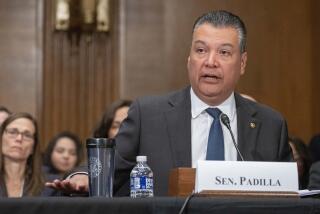Bush to Veto Urban Aid, Tax Bill, White House Says
- Share via
WASHINGTON — The White House said Friday that President Bush will veto the tax-relief and urban aid bill as expected, dashing recent Democratic hopes that he would change his mind and sign it after the Nov. 3 election.
The announcement, made by White House Press Secretary Marlin Fitzwater following a Bush campaign stop in London, Ky., means that the omnibus tax measure, which contains some $28 billion in tax reductions and other benefits, will be dead for this year.
Congress is not in session and, therefore, will not be around to override Bush’s veto.
The veto also will kill a provision to create 50 special “tax enterprise zones” designed to encourage firms to create new jobs in poor neighborhoods. The plan, initially proposed by Bush, was the major urban aid initiative to emerge after the Los Angeles riots last spring.
Fitzwater’s announcement was designed to ward off hopes--raised by some congressional Democrats earlier this week--that the President might sign the bill immediately after the Nov. 3 election, even though he repeatedly has vowed to veto it. The rationale was that if Bush were not hampered by election pressures, he might change his mind.
At the urging of lawmakers in both parties, key Democratic leaders agreed to allow congressional processing of the bill to drag out so the 10-day period the President has to sign the measure under the Constitution would not end until after the election. The 10-day period begins the day after Congress sends legislation to the President, and does not include Sundays or holidays.
The tax bill includes several major provisions that Bush himself proposed, from tax breaks to help revive the real estate industry to expanded benefits for individual retirement accounts. It also would repeal luxury taxes on boats, planes, furs and jewelry.
At the same time, the legislation includes a spate of minor tax “increases,” from limiting the deduction for some moving expenses to denying deductions for club dues.
The President has been especially sensitive to tax increases since 1990, when he reneged on a campaign pledge to approve “no new taxes” during his term. The reversal brought him harsh criticism and he has since said he made a mistake and effectively renewed his vow.
Pressure for Bush to sign the bill came from incumbent lawmakers and lobbyists for various special-interest groups who stood to benefit from the new bill. Among them were farm organizations, fast food and discount chains and museums and universities.
Fitzwater’s confirmation that the President will reject the bill--just as White House aides have been hinting for several days--came as he boarded Air Force One after the campaign stop in Kentucky. The press secretary said simply, “He’ll veto it.”
More to Read
Get the L.A. Times Politics newsletter
Deeply reported insights into legislation, politics and policy from Sacramento, Washington and beyond. In your inbox twice per week.
You may occasionally receive promotional content from the Los Angeles Times.









